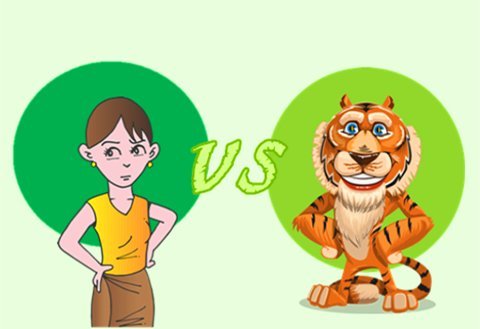
You never know what someone is going to say in Chinese class! I have a million fun memories of moments with my students. But one of my favorite moments was a few years ago when a student of mine, a man in his 30s, was going over daily activities that his family did. He was going along just fine, coming up with sentences that gave a snapshot of what they did on a daily basis. As he kept describing the activities he came up with a new sentence. It took him a little while to put it together in his head and I could tell he was searching for the right words. Finally, he said, confidently:
Xiànzài wǒ de lǎohǔ hé háizi dōu zài shuìjiào.
现在 我 的 老虎 和 孩子 都 在 睡觉。
My tiger and children are sleeping now.
But what he meant to say was:
Xiànzài wǒ de lǎopo hé háizi dōu zài shuìjiào.
现在 我 的 老婆 和 孩子 都 在 睡觉。
My wife and children are sleeping now.
It’s easy to forget vocab in any language, but especially in Chinese. This man was no exception to this rule. He completely forgot how to say the word “wife” in Mandarin. He sat there and kept trying to think of it and came out with “老虎 (lǎohǔ) tiger” instead. Obviously these are two completely different words with completely different meanings! The other students and I couldn’t keep a straight face. We all burst out laughing! He took it like a champ and laughed too, once I pointed out his error.
Sometimes, Chinese learners feel it’s very hard to distinguish similar Chinese words when they are learning Chinese characters.
For example, let’s take a look at 老婆 (lǎopo) and 老虎 (lǎohǔ).
Now, literally, 老 (lǎo) means “old age, or a long time.” However, once it’s put together with other characters, the meaning varies.
Examples:
Wēi ěr xùn xiānshēng pà lǎopo.
威 尔 逊 先生 怕 老婆。
Mr Wilson is henpecked by his wife.
Tā yào wǒ dāng tā lǎopo.
他 要 我 当 他 老婆。
He asked me to be his wife.
In Chinese, we usually put “老 (lǎo)” after the surname of the elderly to express respect. In ancient China, “老人 (lǎorén) the elderly” was regarded as the smart people because they know more than the younger. So “老 (lǎo)” is also used to express respect. And “tiger” is one kind of powerful animals, so people also add the character “老 (lǎo) old” in front of “虎 (hǔ) tiger” to express the powerful meaning.
Examples:
Kàojìn lǎohǔ shì hěn wēixiǎn de.
靠近 老虎 是 很 危险 的。
It’s dangerous to be near to the tiger.
Wǒ bù xǐhuān lǎohǔ.
我 不 喜欢 老虎。
I don’t like tigers.
Quiz
Choose the most appropriate word to fill in the blank.
Jīntiān wǒmen qù dòngwùyuán kàn le ______ .
今天 我们 去 动物园 看 了 ______ .
A. 老师 (lǎoshī)
B. 老虎 (lǎohǔ)
C. 老婆 (lǎopo)
D. 老人 (lǎorén)
Source: echineselearning
Congratulations @echineselearning! You have completed some achievement on Steemit and have been rewarded with new badge(s) :
Click on any badge to view your own Board of Honor on SteemitBoard.
For more information about SteemitBoard, click here
If you no longer want to receive notifications, reply to this comment with the word
STOP